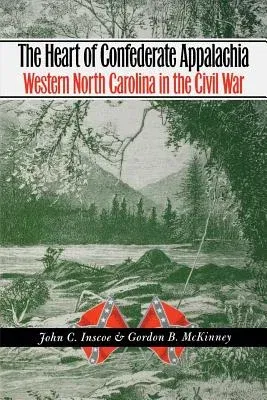In the mountains of western North Carolina, the Civil War was fought on
different terms than those found throughout most of the South. Though
relatively minor strategically, incursions by both Confederate and Union
troops disrupted life and threatened the social stability of many
communities. Even more disruptive were the internal divisions among
western Carolinians themselves. Differing ideologies turned into
opposing loyalties, and the resulting strife proved as traumatic as
anything imposed by outside armies. As the mountains became hiding
places for deserters, draft dodgers, fugitive slaves, and escaped
prisoners of war, the conflict became a more localized and internalized
guerrilla war, less rational and more brutal, mean-spirited, and
personal--and ultimately more demoralizing and destructive.
From the valleys of the French Broad and Catawba Rivers to the peaks of
the Blue Ridge and Great Smoky Mountains, the people of western North
Carolina responded to the war in dramatically different ways. Men and
women, masters and slaves, planters and yeomen, soldiers and civilians,
Confederates and Unionists, bushwhackers and home guardsmen, Democrats
and Whigs--all their stories are told here.
"This thorough and detailed study provides a comprehensive and
sophisticated picture of western North Carolina society during the Civil
War. In so doing, it greatly enhances our understanding of a region that
lay at the heart of the Old South.--American Historical Review
"A much anticipated study of one of the more misunderstood regions of
the antebellum and Civil War South. . . . Virtually every facet of life
in North Carolina's Appalachian mountains comes forth in [this]
well-written and thoroughly researched book.--Appalachian Journal
"The authors have given us the finest account of an Appalachian
community at war by carefully integrating military and civilian affairs
into an elegant narrative. In the process, they have challenged our
thinking about Unionism in North Carolina and wartime dissent against
the Confederacy.--Georgia Historical Quarterly
In the mountains of western North Carolina, the Civil War was fought on
different terms than those found throughout most of the South.
Incursions by both Confederate and Union troops disrupted life and
threatened the social stability of many communities, while internal
divisions among western Carolinians themselves sparked clashes that
proved as traumatic as anything imposed by outside armies. From the
valleys of the French Broad and Catawba Rivers to the peaks of the Blue
Ridge and Great Smoky Mountains, the people of western North Carolina
responded to the war in dramatically different ways. Men and women,
masters and slaves, planters and yeomen, soldiers and civilians,
Confederates and Unionists, bushwhackers and home guardsmen, Democrats
and Whigs--all their stories are told here.


